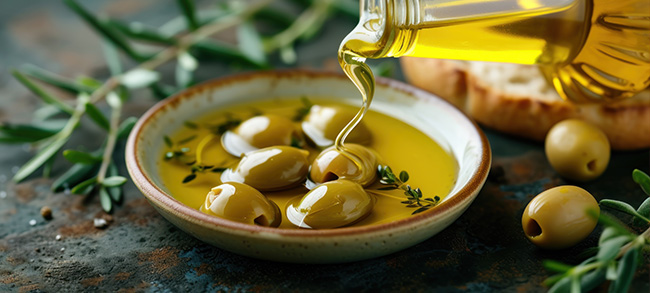Explore the different types of olive oil
In the sun-drenched landscapes of olive groves, where ancient traditions intertwine with modern craftsmanship, a timeless elixir is born – olive oil. Beyond its culinary prowess, olive oil is a testament to the meticulous artistry of its creation, a journey that begins with the tender care of olive trees and culminates in the golden liquid that graces our tables. Join us on a sensory expedition as we unravel the captivating story of how olive oil is made, exploring the harmonious dance between nature and human hands that transforms humble olives into liquid gold.
Before we answer the question ‘what is olive oil made from’, it’s worth taking a minute to explain the different types of olive oil.
Olive Pomace Oil : Low-quality oil extracted from the residue (known as pomace) after the olives have been pressed.
Refined Olive Oil: A higher quality oil than pomace, where the oil is treated, removing the antioxidants and anti-inflammatories. It has little to no colour, smell or flavour.
Virgin Olive Oil : An unrefined oil extracted by a cold-press method with an acidity content of between 1-4%. It has a natural aroma and flavour.
Extra-Virgin Olive Oil : The highest quality olive oil available. Again extracted by a cold-press method with a lower acid content than virgin oil (usually around 0.8%), it retains all the health benefits the oil is famed for and it has a wonderful taste, aroma and texture.
Over half the world’s olive oil comes from Spain, but there are also major producers all over the Mediterranean including Italy, Portugal, Greece and Turkey. So how is extra-virgin olive oil made? The craft of turning olives into oil has been honed in the Mediterranean region over thousands of years, and both the techniques and process used are a regional art. Mediterranean olive trees must mature for several years before they produce olives. The purpose of trimming olive trees is to open more of the tree up to sunshine, as the parts of a tree that are in shade will not produce fruit. It takes at least ten pounds of olives to produce one litre (about four cups) of olive oil.
After washing, pressing which is the main part of the oil extraction, is carried out. Pressing is done with the help of steel rollers, which press every olive fruit until a paste-like material is extracted. Water is then slowly added to the paste, which allows the tiny oil droplets in the mixture to clump together. The long mixing period called; Malaxation, increases the oil production and also adds additional flavour and aroma to the oil. In more modern technology, closed mixing chambers are used to prevent air mixation with the oil, which will otherwise deteriorate the oil’s quality.
What does olive oil taste like?

The flavour of olive oil can vary depending on the region and conditions in which the olives are harvested. For example, olive oil made from olives grown in a warm, dry climate may have a slightly different flavour than olive oil made from olives grown in wetter, cooler climates.
In addition to its flavour, olive oil has a distinctive aroma, which can range from citrusy to earthy and nutty, depending on the type and quality of the olives used.
Shop Cold-pressed Olive Oil Link to product
Extra Virgin Olive Oil Vs. Olive Oil: What’s The Difference?

Extra-virgin olive oil is the highest-quality olive oil. It is an unrefined oil, which means it is made by cold-pressing whole olives without any additional heat or chemicals.
In order to be certified as an extra-virgin olive oil, the oil must be lab-tested for acidity and peroxide values as well as blind-tasted by a certified tasting panel for flavour defects.
Extra-virgin olive oil and regular olive oil can be substituted for each other; however, keep in mind their differing qualities. When substituting regular olive oil for extra-virgin olive oil, remember that regular olive oil has a less intense flavour, which will affect the final taste of your dish.
Not only is extra virgin olive oil loaded with heart-healthy fats, but it’s also a great source of antioxidant compounds. Known for its rich flavour, versatility, and health benefits, extra virgin olive oil is an excellent must-have ingredient to keep in your kitchen cupboard.
Shop Extra Virgin Olive Oil Link to product
Greek Cretan Olives

Some of the best olive oil in the world comes from Kalamata and Western Crete in Greece, thanks to long hot summers, moderate wind and the mountainous landscape which nurtures oil rich olives. You can explore our extensive range of Greek olive oil here.
Shop Greek Olive Oil Link to product
La Española Olives

Discover the rich and delicious flavour of Spanish extra virgin olive oil, made from the finest cold-pressed olives. Spanish olives are known around the world for their exceptional flavour and quality.
Shop Spanish Olive Oil Link to product
As we conclude this exploration into the world of olive oil, it becomes evident that the choice of the best olive oil is a nuanced decision, shaped by a multitude of factors. Whether you find yourself captivated by the robust flavours of Greek olive oils, seduced by the delicacy of Italian varieties, or enchanted by the diverse profiles of oils from Spain, each country offers a unique culinary journey.
Remember, the “best” olive oil is a subjective concept, dependent on personal taste preferences, culinary needs, and the intended use of the oil. Experimenting with oils from different regions can be an exciting adventure, allowing you to discover your own favourite nuances and characteristics.
Ultimately, the world of olive oil is a vast and flavourful landscape, offering a taste of the rich traditions, terroirs, and craftsmanship that each country brings to the table. Whether you choose the peppery notes of a Greek extra virgin, the fruity undertones of an Italian blend, or the well-balanced profiles of Spanish oils, let your palate be the guide on this culinary expedition.
So, embark on your olive oil journey with an open mind, savor the diversity each country has to offer, and may your culinary endeavors be seasoned with the liquid gold that is olive oil. Cheers to the art of selecting and appreciating the finest olive oils from around the globe!







